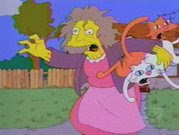Now that I have finished the book, I decided my last blog post shouldn’t be about death, but rather his triumph. The part that followed Charles’ success was basically just a huge spending spree. Charles and his wife, Joyce, went all out on their new house,
At a cost of $20,804.75, she [Joyce] rolled out a tennis court, lighting it for nighttime play (a novelty at that time, when even night baseball games were new), and put in a heated swimming pool, bathhouse, children’s wading pool, and stone waterfall, all enclosed by an Anchor fence… The kitchen was her command post, and she designed it as “a housewife’s dream” with… two ovens, two refrigerators, and a separate deep-freeze for stocking meats…She rolled out tarmac pathways for bikes and installed a pathway with standard school yard equipment including a slide, swings, and climbing bars; she bulldozed woods to claim a Little League-sized baseball diamond… (Michealis 327-329)
One of the first things that I thought when I read this was; why hadn’t I heard of this place before? It is definitely a strong argument against the idea that money cannot buy happiness. I think the house was a way of showing off his success not necessarily his fortune. Sparky had always had a compulsive need to be liked, which carried over to Charlie Brown. It may seem strange the same man who built such a massive and expensive fortress, weeks before, didn’t even want to go collect the awards he had won (Michealis 29). However, he had worked so hard to achieve his fame that his house was a way to show everyone what he had accomplished.
It wasn’t long after he became a household name that he was approached about making a short Christmas show. Lee Mendelson would produce the show, Sparky would write the script, and Sparky wanted Bill Melendez to animate the feature because of not “Disneyfying” the Peanuts in an unrelated commercial (Michealis 346-347). One of the biggest issues, however, was a key element in the storyline. According to Michealis, “But Mendelson had not realized just how much of the Gospel Schulz intended to include in the movie. When Sparky began work on the script, he “proudly announced,” as Lee recalled it, that there would be “ one whole minute” of Linus reciting the Gospel…(349).
As I have said in previous blog posts, Sparky’s faith was very important to him and I am not surprised that he put it in his show even if television, at that time, was hesitant to put up religious shows. Even though his characters are famous, he is very insistent on not letting them become like Disney characters, which I’m sure is why he wrote the script. He just wanted his ideas and characters to be original and enjoyed by all.
Subscribe to:
Post Comments (Atom)

No comments:
Post a Comment